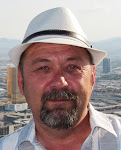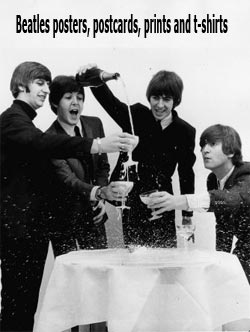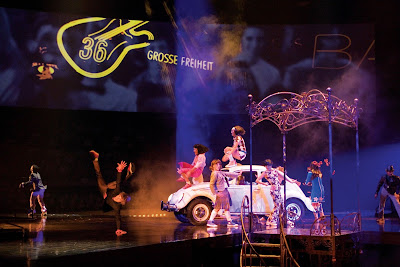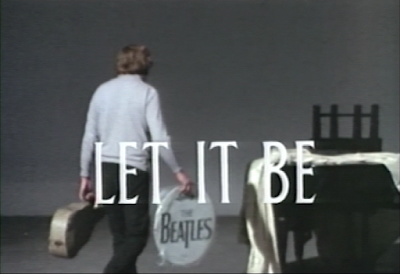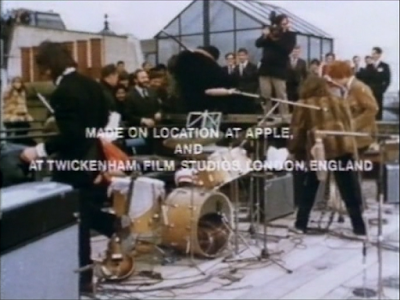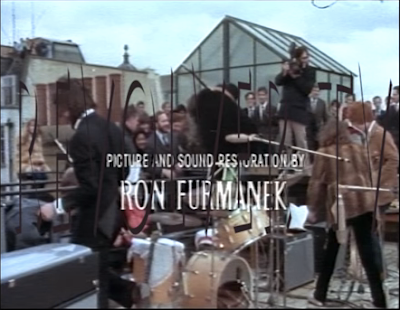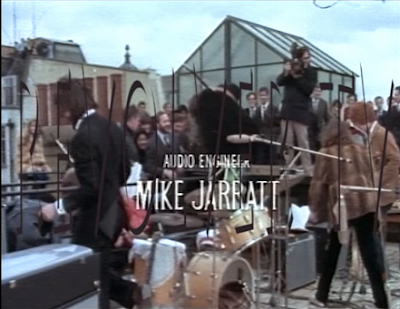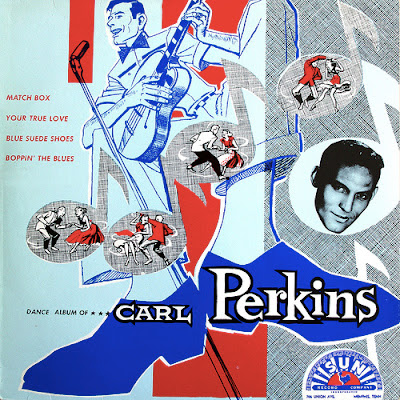 |
| Dance album of Carl Perkins |
Those of you who have read Mark Lewisohn's "Tune In " book will have noticed that the Beatles were very fond of the "Dance Album of Carl Perkins", and that they performed and/or recorded several of the tracks from the album. And it didn't stop there.
" book will have noticed that the Beatles were very fond of the "Dance Album of Carl Perkins", and that they performed and/or recorded several of the tracks from the album. And it didn't stop there.
The album was first released in 1957 or 1958 on Sun Records. It has been said that Sam Philips rushed the album out after Perkins had left the Sun label for Columbia, which would make it 1958. Reading the track list now, it looks like a "Greatest Hits" album, but that's only because most of the songs have later carved their way into our collective minds as standards from the rockabilly era. It also helps that several of the songs, "Matchbox", "Honey Don't" and "Everybody's Trying to Be My Baby" were later recorded by The Beatles, and their versions sold millions. Put together from his Sun single releases, Carl's album was later re-released as Teen Beat; The Best of Carl Perkins in 1961.
From 1954 to 1957, Carl Perkins and his band, recorded the following recordings for Sun Records:
"Movie Magg"/"Turn Around" (Flip 501) 1954, "Let The Jukebox Keep On Playing"/"Gone, Gone, Gone" (SUN 224) 1955, "Blue Suede Shoes"/"Honey Don't" (SUN 234) 1955, "Sure To Fall"/"Tennessee" (SUN 235) 1955, "Boppin' The Blues"/"All Mama's Children" (SUN 243) 1956, "Dixie Fried"/"I'm Sorry I'm Not Sorry" (SUN 249) 1956, "Your True Love"/"Matchbox" (SUN 261) 1956, "That's Right"/"Forever Yours" (SUN 274), and "Lend Me Your Comb"/"Glad All Over" (SUN 287) 1957.
In the U.K., the "Dance" album was released in 1959 on the London label, which is likely the edition The Beatles had access to.
 |
| U.K. edition of the album on the London label. |
But John Lennon had an earlier encounter. He had bought Perkins' 78 rpm "Blue Suede Shoes" single in 1956 and was so thrilled with both songs that he purchased Perkins' next single, "Matchbox" upon release in 1957, at age 16. When the album came out, it was one of only two albums which he played through completely - enjoying all the songs, according to a 1980 Lennon interview.
When the Beatles all came up with pseudonyms during their brief 1960 Scotland tour backing Johnny Gentle, George Harrison opted for the stage name Carl Harrison, in tribute to Carl Perkins.
A waning star in the USA, Carl Perkins toured Great Britain together with Chuck Berry in May 1964. At the tour's wrap-up party, Perkins sat on the floor sharing stories, playing guitar, and singing songs while surrounded by the Beatles. Ringo Starr asked if he could record "Matchbox". Perkins answered, "Man, go ahead, have at it." The Beatles had also previously recorded two versions of his "Glad All Over" for the BBC in 1963, as well as a version of that single's other side, "Lend Me Your Comb". On June 1, Perkins was invited to attend a Beatles recording session at the EMI studios in Abbey Road, where they recorded "Matchbox".
Here's the "Dance Album of Carl Perkins" track by track, and it's Beatles connotations.
BLUE SUEDE SHOES was originally released as a single in December 1955, coupled with "Honey Don't". The single was SUN's first million seller and it peaked at number 4 in Billboard's Hot 100 chart. A number of rock 'n' roll oldies were recorded during The Beatles' Get Back sessions in January 1969, at Apple Studios in London. A medley eventually released on The Beatles' album "Anthology 3" in October, 1996, comprised "Rip It Up", "Shake, Rattle And Roll" and "Blue Suede Shoes". The medley wasn't actually recorded as one, these songs were among a number of rock 'n' roll songs played by The Beatles on 26 January and mixed in stereo the same day. Lennon and McCartney shared vocals on "Blue Suede Shoes". The song was performed later that same year by John Lennon with his Plastic Ono Band in concert at the Toronto Rock Revival Festival on 13 September, 1969 and a recording of the concert was released in December that year, as the album
Live Peace in Toronto 1969
. Lennon's version was also featured on the Carl Perkins' collaboration album
Go Cat Go
in 1996.
The Perkins family still owns his songs, the rights to which are administered by Paul McCartney through his publishing company MPL Communications. McCartney recorded a version of
MOVIE MAGG on his 1999 album
Run Devil Run
. He had previously recorded a version with Wings in October 1980, during rehearsals for what was eventually to become his 1982 solo album "Tug of War", the rehearsal version circulates on bootlegs.
The Beatles first recorded
SURE TO FALL (in love with you) as part of their Decca audition on January 1, 1962 in London. The Beatles thought highly enough of the song to record "live" versions of it four times for the BBC, all broadcast on the group's BBC radio programs. A recording made on 1 June 1963 for the BBC radio series Pop Go the Beatles would later appear on the Beatles' 1994 compilation album "Live at the BBC". Their September 3, 1963 BBC recording appeared on the 2013 compilation album "On Air – Live at the BBC Volume 2". Prior to this, the Decca audition version of "Sure To Fall" had appeared on a number of grey market releases of the Decca tapes in the eighties.
"Sure To Fall" was played by Wings at an October 1980 rehearsal, which circulates on bootlegs. Ringo Starr later recorded a new version of "Sure To Fall" on his 1981 album,
Stop and Smell the Roses
, produced by Paul McCartney who also played bass guitar and piano. The song would also appear on Ringo's 1989 greatest hits collection
Starr Struck: Best of Ringo Starr, Vol. 2
.
GONE GONE GONE was jammed by The Beatles on January 7, 1969 - early on in the Get Back sessions. It was almost complete, too.
The Beatles recorded their version of
HONEY DON'T on October 26, 1964 as one of the last songs recorded for Beatles for Sale, which was released in the United Kingdom on December 4, 1964. Originally, John Lennon had been handling the lead vocals on the Beatles' concert performances of the song, but for the album, Ringo was handed the song as his one token song per album. The Beatles performed the song twice for the BBC for the From Us To You and Top Gear programs. A version sung by Lennon is available on Live at the BBC, and a version sung by Starr was released on On Air – Live at the BBC Volume 2. During rehearsals for his Plastic Ono Band album in 1970, John Lennon sang this song again, plus "Matchbox" - both exist on tape but are as yet unreleased. A version featuring both Ringo and Carl was performed on the TV special "Blue Suede Shoes: A Rockabilly Session" in 1985.
ONLY YOU (And You Alone) was suggested by John Lennon as a song for Ringo to do on his
Goodnight Vienna
album. John played acoustic guitar and sang a guide vocal over the backing track of "Only You", onto which Starr later overdubbed his own lead vocals. Lennon's version was later rediscovered and included on the 1998 box set
John Lennon Anthology
, and on the highlights collection
Wonsaponatime
. Starr's recording was issued as a single in 1974. Early in the following year became a number one hit on the US Hot Adult Contemporary Tracks chart, and reached number six on the Hot 100.
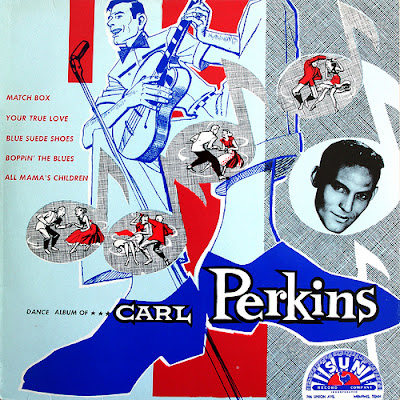 |
| "All Mama's Children" - a rogue track on some pressings of the album. |
ALL MAMA'S CHILDREN - this song is a bit of a mystery. Many editions of Perkins' "Dance" album have 12 tracks, but this one appears on a number of pressings as a thirteenth song. Was it added to the album as an afterhought? It has been confirmed that the song is mentioned on the front cover of the original pressing, but not on the back, nor on the label - and the song is not present on the record itself. It's not on the UK pressing, but it's the seventh and final track on side 1 when the album was re-released as "Teen Beat; The Best of Carl Perkins" in 1961 - although it may have been introduced on later pressings of the original album which ocurred earlier than 1961.
The B-side of Perkins' single "Boppin' The Blues" in 1956, "All Mama's Children" was co-written by Carl Perkins with Sun label mate Johnny Cash. Some later repressings of the "Dance" album feature this song and some don't. No Beatles connection that we know of, it wasn't even jammed during the Get Back sessions - probably because it wasn't present on the album they had listened to in the early days.
 |
| A back cover showing the placement of "All Mama's Children" in the lineup. |
TENNESSEE was briefly
jammed by The Beatles during the Get Back sessions on January 9, 1969, the vocals were handled by John Lennon, briefly joined by McCartney on harmony vocals. George also joins in, and he's probably the one who remembered the lyrics best.
WRONG YO-YO - or Right String but Wrong Yo-Yo is another one of those tracks that were just jammed at the Get Back sessions. This was the final day of the sessions, January 31, 1969 - the day after the rooftop concert. The Beatles taped and filmed "Two of Us", "Let It Be" and "The Long and Winding Road" for the documentary and album, but also played around twenty other songs, including
this one from Carl Perkins.
The Beatles recorded the Carl Perkins arrangement of
EVERYBODY'S TRYING TO BE MY BABY on 18 October 1964 at EMI Studios, London, with George Harrison on vocals. It was first released as the final track on Beatles for Sale in the U.K. later that year. They had been playing it live since 1961. The Beatles' recording finishes with a false ending, with the final phrase repeating itself after the song seems to have stopped. A version recorded live at the Star-Club in Hamburg in December 1962 contained four of these musical phrases. The Beatles continued to perform the song after their studio recording was released, and although the performance of this song was recorded at Shea Stadium on 15 August 1965 was missing on the concert film, the song from this performance was included on Anthology 2.
Live performances of the Beatles' "Everybody's Trying to Be My Baby" were recorded in June 1963 for the BBC radio program Pop Go The Beatles, and in November 1964 for Saturday Club. The latter recording can be heard on Live at the BBC.
George Harrison performed the song with Carl Perkins on the TV special "Blue Suede Shoes: A Rockabilly Session" in 1985.
The Beatles began performing
MATCHBOX around 1961. Their then-drummer, Pete Best, performed the lead vocals. In 1962, John Lennon sang the song during a performance at the Star-Club in Hamburg, Germany; a recording of this exists and was included on "
Live! at the Star-Club in Hamburg, Germany; 1962
".
The next year, the Beatles performed "Matchbox" with Ringo Starr on lead vocals for their BBC radio show, and this version would be included on the "Live at the BBC" album.
Starr also sang lead vocals when it was recorded on June 1, 1964 for the "Long Tall Sally" EP, with Perkins present in the studio. The EP was released released in the UK on June 19th, 1964. In America, the Capitol album "Something New," which contained the song, was released on July 20th, 1964. A single containing "Matchbox" coupled with "Slow Down" took the song into the Top 20 on the Billboard charts, peaking at #17 in October. According to legend, the success of the song and later Beatles recordings of Perkins' songs finally made the composer wealthy enough to buy his parents a new house.
John Lennon also sang it during a taped rehearsal for his 1970 Plastic Ono Band album, but it remains unreleased.
In February 1987 at the Palomino Club in Los Angeles, celebrity guests including George Harrison joined Taj Mahal in an unplanned jam session after the regular concert. The two-hour performance is captured on low-quality videotape, connected to the in-house video system. Amongst the tracks George performs are "Matchbox" (with Mahal), "Honey Don't" and "Blue Suede Shoes" (with John Fogerty). The performance is not released.
Not to be outdone, Paul McCartney has also performed the song many times. In 1990, a live version by McCartney was released on his "
Tripping The Live Fantastic
" concert album. A year later, he performed an acoustic version at his MTV Unplugged TV special in 1991, but the song was not included on the subsequent album, "
Unplugged (The Official Bootleg)
". However, a rocking soundcheck version was released on a DVD which accompanied his "
Back in the US
" CD.
In conclusion, "Matchbox" is probably the only song all
five Beatles have been handling the vocals for.
YOUR TRUE LOVE was briefly revisited by The Beatles during a Get Back session on January 3, 1969.
The song was performed by George Harrison and Dave Edmúnds for the TV special "Blue Suede Shoes: A Rockabilly Session" in 1985 and later released on a CD,
Carl Perkins & Friends - Blue Suede Shoes - A Rockabilly Session
on Snapper Records in 2006.
Paul McCartney and Carl Perkins played this song together at a filmed jam session backstage at the Memphis Bowl in 1993, highlights from that session was released on a pair of video cassettes (
My Old Friend
and
Go Cat Go!
) by Perkins in 1998.
At Carl Perkins' funeral service on January 23, 1998,
George performed the song as a tribute to his old departed friend. The song didn't seem to be familiar to the rest of the mourners.
BOPPIN' THE BLUES was performed and recorded by Paul McCartney with Carl Perkins in 1981 at Montserrat, but remains unreleased. Carl Perkins arrived for the "Tug of War" recording sessions in Montserrat on 21 February, 1981. He and McCartney began recording three days later, performing oldies including "Honey Don't", "Lend Me Your Comb" and "Boppin' The Blues". A duet, "Get It", was also taped that day, and released on McCartney's album the next year. Together they also recorded Perkins' tribute to McCartney, "My Old Friend", on 25 February. That song was unreleased for more than a decade, but finally appeared on Perkins' collaboration album "Go Cat Go" in 1996.
 |
| The Beatles positively mined this album for songs. |
IN CONCERT
Paul McCartney regularly performs songs from Carl Perkins' "Dance" album at soundchecks. Last time he played here in Norway (2015), he did three in a row: "Matchbox", "Honey Don't" and "Blue Suede Shoes". McCartney's soundchecks are famously not really soundchecks per se, but pre-concert one hour concerts for VIP ticket buyers.
Ringo has performed "Honey Don't" with several of his All Starr Band lineups many times through the years, and several live versions are featured on his many live albums. The song made it's debut on the first self-titled
Ringo Starr and his All Starr Band
album in 1990. "Matchbox" was first performed live by Ringo in 2012 and was included on his "
Ringo At The Ryman
" DVD that year. On January 27th, 2014, at the Los Angeles Convention Center, Ringo performed "Matchbox" during the 50th Anniversary of The Beatles' first appearance on the Ed Sullivan Show, this televised show being broadcast on CBS on February 9th of that year.
SELECTED RE-RELEASES
The "Dance album of Carl Perkins" was re-released in the U.K. on Charly Records in 1981, catalogue number CRM 2012. That same year, an Italian release on the Oxford label was made available. In 1984, a Spanish release of the album appeared on the CFE label. In Australia, Topline Records released the album in 1987. A CD of the album was released in the U.S. by Varèse Sarabande in 2004. In the U.K. , Snapper Music and Charly Records released a CD with plenty of bonus tracks as SNAP 291. In 2015, as part of Record Store Day's "Black Friday", a
remastered translucent colour vinyl edition of the album
was pressed, limited to just 1500 copies worldwide. Although the track "All Mama's Children" was mentioned on the web page of the release, it failed to appear on this pressing of the album, which then stayed truer to the original.







